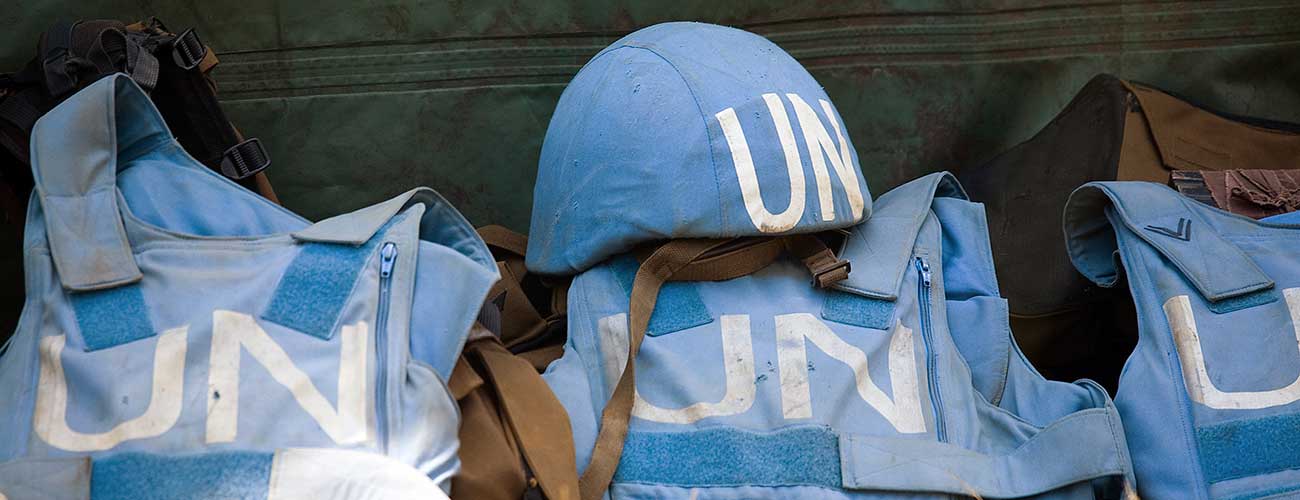In August 2014, eight months into South Sudan’s still-raging conflict, some aid worker friends started telling me to get to Bentiu. That the tens of thousands of civilians crowded into the United Nations base on the town’s outskirts faced appalling conditions: food shortages, collapsed toilet blocks, and floodwater creeping into their makeshift homes.
Frustrated humanitarians complained the UN Mission in South Sudan (UNMISS) wasn’t moving fast enough to address the situation. Urging journalists to write about it, they hoped, might push UNMISS to allocate more land and make infrastructure improvements. I had been working in Juba, the country’s capital, as Voice of America’s bureau chief since March 2013, while picking up regular freelance assignments on the side. Once the conflict started, I pivoted to primarily covering the humanitarian crises that followed inevitably from the war. Establishing the situation in Bentiu seemed a natural extension of that coverage.
Except for this: The only ways into the town were on a free UNMISS flight or through the World Food Program-run UN Humanitarian Air Service (UNHAS)—the same groups I was setting out to investigate. Other options included a likely impossible drive over waterlogged roads while trying to dodge ever-shifting frontlines, or hiring my own plane.
My dependency on the UN and its agencies didn’t end with transportation. Unless I had arrangements with a non-governmental organization (NGO), I had to rely on UNMISS for accommodation when I arrived at a camp, for security to venture out beyond its bases, and even for access to its canteen if I wanted to eat anything besides the tins of near-expired fava beans I carried with me.
I wasn’t assuming that UNMISS deserved all—or any—of the blame for the situation in Bentiu. But if that’s what my reporting revealed, I was going to be in a quandary. Run that story and risk a possible loss of access, not just to Bentiu, but to all locations where UNMISS flew; to the displacement camps within the bases; and, possibly, to the mission’s officials, who were often key sources for my stories. The alternative, though—downplaying any potential responsibility for the camp’s condition—flew in the face of unbiased reporting.
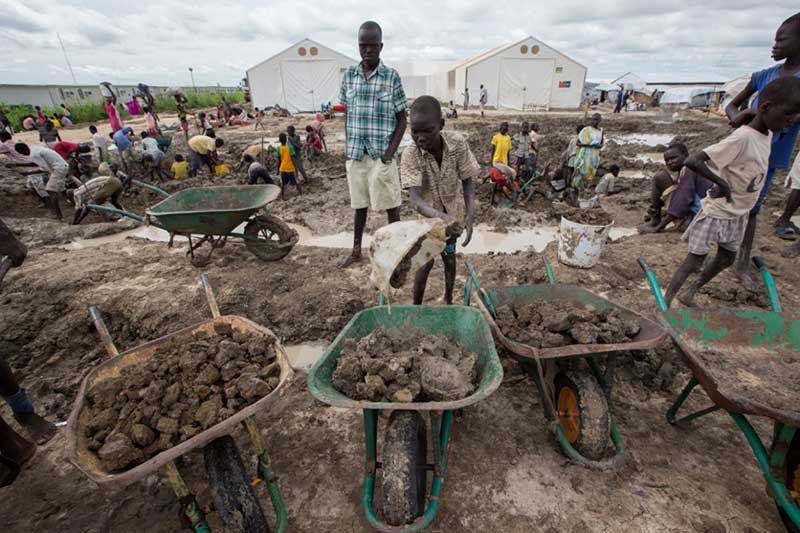
The Protection of Civilians (POC) site near Bentiu, in Unity State, South Sudan, houses over 40,000 displaced persons (IDPs) seeking shelter from armed conflict in the area. Due to signifcant flooding during the rainy season, the UN Mission in South Sudan (UNMISS) is working with humanitarian partners and others to improve conditions for both the short and long term. A boy fills a wheel barrow with dirt to be used to build walls to keep floodwater contained. August 25, 2014. Bentiu, South Sudan (UN Photo/JC McIlwaine)
The shuttering of foreign bureaus has given freelancers a bigger role in covering international news, but when it comes to negotiating ethical gray areas like this, they are largely on their own. And though these relationships with NGOs and the UN are often restrictive, they are also potentially profitable and entirely necessary to safely and affordably report important stories. By working closely with these organizations, journalists may cede too much control to the humanitarian community. But if they refuse any humanitarian support, vital stories will go untold.
The situation is not dissimilar to a military embed, but usually without the explicit agreements that govern those relationships. And the compromises that come with hitching onto a humanitarian organization rarely make it into the final copy: the limitations to access and sources, the potentially problematic commitment—sometimes explicit, but often unspoken—to either report on or overlook some of the realities journalists find. Offer a criticism and, along with the discomfort that comes with critiquing an organization that is trying to do good, you might also lose future access. The same goes if you fail to mention their work at all.
When it came to my Bentiu story, UNMISS says that wasn’t the case. “There are absolutely no expectations that journalists assisted by us report on a certain issue and/or in a certain way,” the communications team wrote in response to emailed questions from CJR.
But I was friendly with much of the UNMISS communications team, many of whom were former journalists, themselves, and I knew they were not afraid to apply pressure when they thought the mission was being unfairly represented. Journalists have even written about UNMISS’s threats to cut off access.
Muddying the situation even further, freelancers regularly moonlight as writers and editors for some of the very same humanitarian organizations they cover. From an aid agency’s perspective, the thinking is straightforward: Here’s a pool of skilled professionals with an obvious interest in humanitarian work. For the freelancer, these often-lucrative assignments can be a financial lifeline. An assignment I took to write a handful of feature stories for South Sudan’s UNAIDS office in late 2014 subsidized three months of reporting in that overpriced and under-supplied country. It also meant that I stopped covering HIV in South Sudan, because I worried my stories would be seen as biased.
It’s obvious what’s gained from these collaborations. As travel budgets decline, the work of far-flung freelancers is increasingly in demand, but often without any initial financial outlay from the outlets that eventually run our content. That leaves a freelancer with the near-impossible task of figuring out how to cover the cost of transportation, fixers, translators, equipment, and accommodation, while still being able to eat.
That calculation changes when a UN agency or an NGO springs for the cost of a flight or offers a place to stay.
Beyond the bottom line, there is the issue of safety. Freelancer Sophie Cousins started reporting from Syria in 2013, working with fixers to access sources and avoid dangerous situations. When she began planning a May 2014 trip to Aleppo to report on the health consequences of barrel bombings by the Syrian regime, she decided she no longer felt comfortable relying on a fixer to guarantee her safety.
“After so many kidnappings and subsequent beheadings, I felt that going with an NGO that knew Aleppo inside out was my safest option,” she explained in an email to CJR. She had covered the work of the Syrian American Medical Society, or SAMS, an emergency medical NGO, and knew some of its staff members well. “I trusted them completely and believed in what they were doing,” she wrote. She decided to accompany them on one of their regular missions to deliver medicines and equipment to hospitals throughout the Syrian city. They postponed the trip once when a car bomb went off at a border crossing, but eventually—“dressed as Syrian as possible”—Cousins crossed the border with a SAMS team and made it into Aleppo.
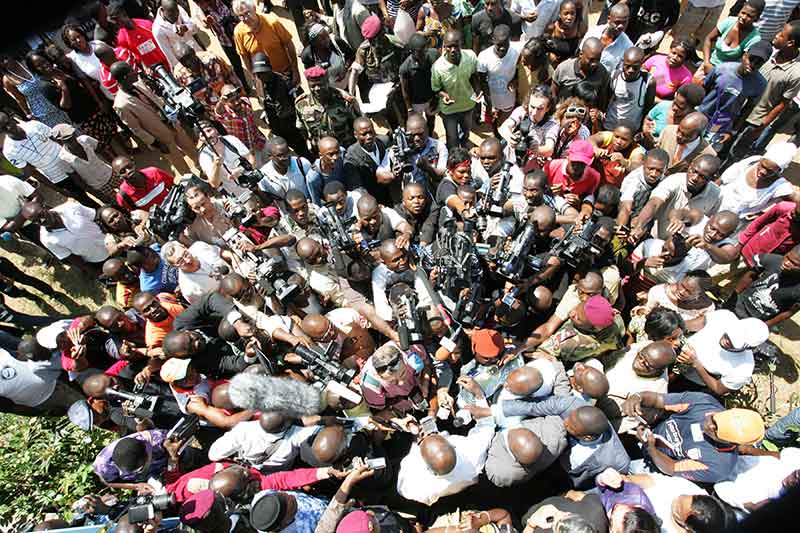
Hundreds of journalists from the national and international press swarm to cover presidential elections in Abidjan, Côte d’Ivoire. October 31, 2010. Abidjan, Côte d’Ivoire (UN Photo/Basile Zoma)
“There’s nothing I wasn’t able to do,” she wrote. “I really felt that, more than anything, they wanted me to get the whole picture.” They drove her around the city, even taking her to hospitals they weren’t supporting, to ensure she saw the full impact of the bombings. She returned with the stories she’d set out to tell, ultimately writing articles for both Nature and The Lancet. “In a safe reporting environment, I would have chosen to work independently,” she wrote. “But under the circumstances, this was 100 percent my best option.”
What is not so obvious—especially to readers—is what the journalist relinquishes in these transactions. In an ideal scenario, the answer is nothing. Ian Bray, a senior humanitarian press officer at Oxfam, says taking journalists to the field is usually mutually beneficial.
“We obviously can do our own videos,” Bray says. “We obviously can use Twitter, Facebook, and our website. It reaches a small audience and you also expect us to say what we’re saying.” Whereas, if a journalist is reporting on the same situation, “it’s generally perceived as an independent look.” As a result, Oxfam is usually eager to get journalists into the field. The reporter gets the story, the NGO gets coverage, and both sides are generally satisfied, says Bray, who started as a press officer more than 20 years ago.
But agency priorities do not always dovetail so neatly with journalists’, as Gabrielle Paluch was frequently reminded in Myanmar. She moved to the country in 2009 to work for The Myanmar Times, and eventually freelanced from the region for outlets including the Los Angeles Times, The Guardian, and Al Jazeera.
When she arrived in Myanmar, she says UN agencies were contending with a government that was constantly threatening to restrict their activities. And humanitarian officials worried “if they lose access, they won’t be able to do anything,” she says. “It was better to compromise than lose access.” Those compromises seemed to include an unwillingness to criticize government programs, including a 2014 census that completely excluded the Rohingya ethnic group.
While Paluch was happy to question the UN line, it became more difficult when the truth could only be found by venturing to remote parts of the country. Because the government could easily restrict journalists’ movements, access often came only in the form of excursions with UN agencies. Those sometimes felt like “PR trips,” Paluch told me, and left her uncertain whether it was better to put together heavily caveated reports from those jaunts or ignore them entirely. Even establishing basic facts for some stories could become difficult, because the government didn’t want aid agencies to use the word Rohingya.
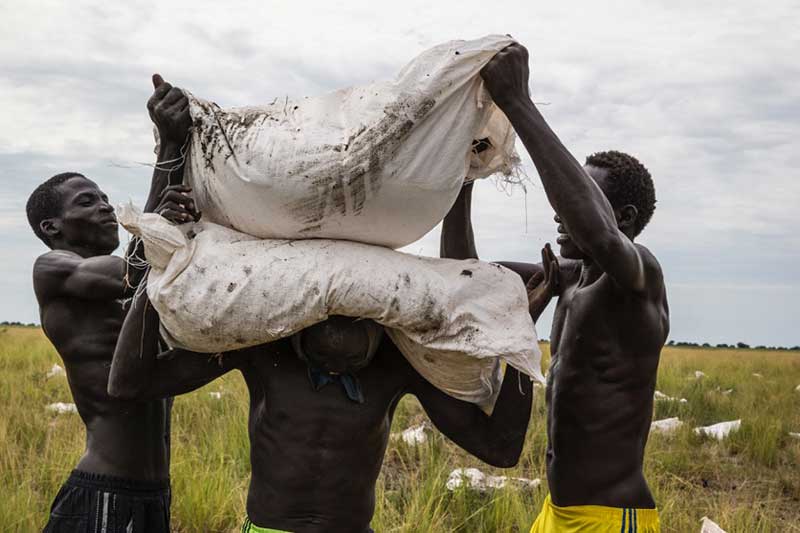
The United Nations Mission in South Sudan (UNMISS) peacekeepers from the Mongolian Battalion (MonBatt) provide security as the World Food Programme (WFP) drops food in Bentiu. Locals carry bags of food supplies air-dropped by a WFP aircraft. October 21, 2015. Bentiu, South Sudan (UN Photo/Isaac Billy)
“You’re constantly forced into this weird meta-discourse before you can even approach the story,” she says. “And that becomes the story, and you can’t even get into the other stuff.”
Similar attempts to circumscribe reporting came up repeatedly in my conversations with freelancers. Many of the journalists I spoke to were reporting from the sites of natural disasters or active or recent conflict zones, and they said the UN and aid groups were constantly weighing government and international pressures and security concerns against their interest in providing information or access to journalists.
Where access is granted, the aid groups often expect something in return. After an organization has ferried a reporter to the frontline or to a disaster site, it’s usually assumed that the group’s response will feature prominently in the resulting story—even when it might not be merited.
It wasn’t long after he arrived in South Sudan that Jason Patinkin, a freelance journalist, began trying to avoid this type of dependence on UNMISS. It’s not a huge sacrifice he said, because the access the mission offers is primarily to places where it has bases, while most of the fighting is happening far from these locations. Instead, he tries to use UNHAS flights to get around the country. Along with payment—at least $400 per round trip—UNHAS passengers must be sponsored by an NGO.
In his early days covering South Sudan, an aid group offered to pay for his travel to a spot where the group had programs running—a practice that was also common during my time in the country. “That was fine until the story I wrote ended up not giving enough credit to their organization,” Patinkin says. “That really hurt my relationship with that organization.” He hasn’t worked with them since.
Media specialists at the NGOs and UN agencies I spoke to had different reactions to this scenario. Bray says Oxfam staff members are often asked to help a journalist or reader make sense of a situation, and he puts some of the onus on his team to provide useful context to the reporter. “If it fits in with the story you’re writing, you’ll use it,” he says. “If it’s not interesting and doesn’t make much sense, you won’t.”
Margaret Traub takes a harder line. The head of global initiatives for International Medical Corps (IMC) and a former writer and producer for CNN and Good Morning America, Traub highlighted the costs—in paying for transportation and accommodation, but also in staff time spent in interviews or dealing with logistical hurdles—that an NGO assumes in getting a journalist to the field. The payoff has to be more than just greater awareness of the situation.
“We have to fundraise around these crises and continue our work,” she says. “If the public sees us in a piece that airs, they know our name and might donate. It’s important to us.” As a result, she has frank discussions about IMC’s expectations for coverage before the group takes a journalist out in the field. Those expectations include respecting the communities IMC is assisting and generating sophisticated, compelling coverage of the situation that includes explicit mentions of the organization’s work.
Even when the ground rules are not so clearly stated, freelancers told CJR they are sensitive to the assumed quid pro quo and will intentionally work references to the aid groups that have helped them into their stories. And several told me they had shied away from critical coverage of NGO programs that appeared ineffective in a bid to maintain their access.
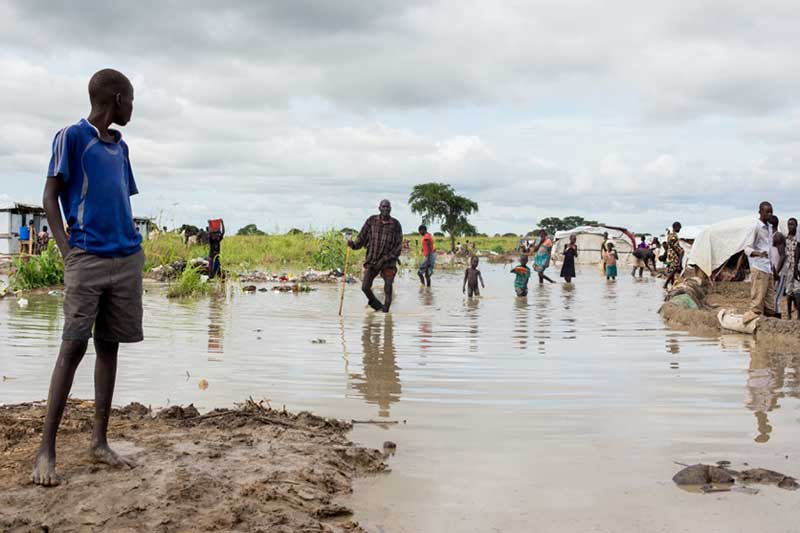
The Protection of Civilians (POC) site near Bentiu, in Unity State, South Sudan, houses over 40,000 displaced persons (IDPs) seeking shelter from armed conflict in the area. Due to signifcant flooding during the rainy season, the UN Mission in South Sudan (UNMISS) is working with humanitarian partners and others to improve conditions for both the short and long term. POC site residents wade in the flood waters. August 25, 2014. Bentiu, South Sudan (UN Photo/JC McIlwaine)
Since his earlier experience, Patinkin discusses these issues with a group ahead of time to avoid being committed to coverage he feels is unmerited. He also pays for his own flights now to lessen his dependence on aid organizations. “I try to operate very independently,” he says. “It does require more planning and more expense, but it ultimately leads me to being able to write things that others aren’t.”
Even so, he worries that he is still too beholden to the agenda of NGOs and UN agencies—something freelancers complained of over and over. They have little time and space to report on extremely complicated issues. It’s often easier to follow the lead of NGOs and the UN or to rely on sources within these agencies, because they are quick to respond and can speak in sound bites. And it’s an impulse that’s reinforced in the field when you travel and eat together, or live in an NGO guesthouse.
“The fact that you’re staying and moving with an NGO or the UN gives them a lot of influence over you,” Katarina Höije, a freelancer who has been covering sub-Saharan Africa since 2012, wrote me in an email.
Stringers are often dependent on NGOs for more than access and story guidance. In the hand-to-mouth world of freelance foreign correspondence, picking up work for NGOs and UN agencies can be lucrative. But it can also be ethically thorny.
Priya Shetty has been bouncing back and forth between these worlds for years. Currently a staff writer for the World Health Organization, she has covered medical and scientific issues for The Lancet and The Guardian, among other outlets.
Her policy has been to restrict herself to technical reporting for agencies and organizations, and to shy away from more traditional communications work, like drafting press releases. “I just thought: If I go down that route, I would have to completely stop working as a journalist,” she says. Not because anyone told her she would, but “because of my own internal thinking. I’ve followed my own ethical code.”
That’s the reality for freelancers who find their services increasingly in demand by aid agencies. But, in the absence of the structure provided by a newsroom, they lack any professional policies to guide those relationships.
A UN employee who was granted anonymity to speak freely about her organization tells CJR that with a mounting number of humanitarian crises, agencies are running out of people to manage press relations and are increasingly turning to freelance journalists to fill the gaps. The UN High Commissioner for Refugees, for instance, was overstretched last summer by demands created by the refugee crisis in the Mediterranean. So “they hired freelancers to do stories for them. I think that’s the way it’s going a lot,” the UN employee says. As editors discovered a while ago, “it’s cheaper to hire a freelancer.”
She sounded a note of concern. “If your bread and butter is coming from the [UN] agencies, you’re not going to want to write bad things about them. It doesn’t do wonders for journalism.”
Freelancers fret constantly about the ethics of these collaborations, even as they continue to enter into them. But for many, the benefits are too significant to ignore.
Lena von Naso is a political scientist with the University of Augsburg in Germany who has spent the last three years researching the interactions between foreign correspondents and humanitarian organizations in sub-Saharan Africa for a Ph.D. project scheduled to be published this year. She says journalists usually adopt one of three approaches to these relationships.
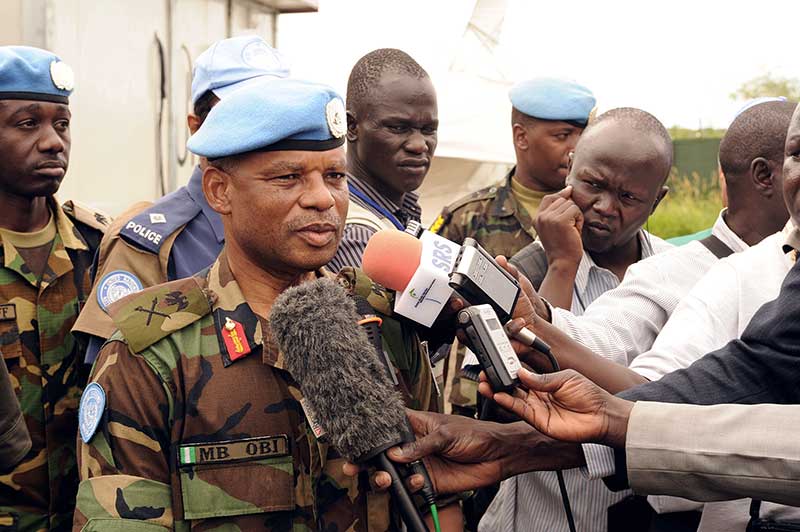
Moses Obi (front), Interim Force Commander of the United Nations Mission in the Republic of South Sudan (UNMISS), speaks with the press after his tour of Pibor to assess the security situation, mainly pertaining to child abduction and cattle raiding. August 9, 2011. Pibor, South Sudan (UN Photo/Isaac Billy)
The first group of reporters draws a hard line and refuses to rely on NGOs or the UN. In instances where it’s unavoidable, these reporters try to explicitly acknowledge such relationships in their work. The second group has put little thought into the issue and generally perceives humanitarian organizations as “doing good,” von Naso says.
“The third type, which are the most people, they see it as mutually beneficial for both sides and they accept it,” she says. “That doesn’t mean they like it, but they feel it’s a more practical approach. They feel they don’t have a choice.”
That perspective reflects my own thinking, along with that of nearly all the freelancers I spoke to. In the absence of any hard-and-fast rules about what is correct, most of us set our own ethical benchmarks and try to stick to them—whether in writing about an organization or working for one. It may mean eating some of the costs of the trip or setting an explicit agreement before heading out into the field. It might mean accepting some NGO contracts, while rejecting others. Freelancers told me they have even traded on their skills, offering a separate story or photos to a humanitarian agency in return for unmitigated access to a location to do independent reporting. In the end, financial and security realities almost always make some compromise inevitable.
Von Naso says that most of the journalists she’s talked to have “very high values they want to hold up. In reality, it’s not always possible to report as independently, as neutrally, as you would like.”
There is little sign of these ethical struggles in the final product, though. Walking readers through the mental gymnastics of these decisions would render most dispatches unwieldy and it’s rare for an editor to ask for this information, anyway.
But some editors say they can’t avoid addressing these issues. Lonneke van Genugten is the editor in chief of OneWorld, a Dutch publication that focuses on international cooperation and sustainability issues, and that publishes regular content from freelancers.
Of course freelancers will have to collaborate with NGOs, van Genugten acknowledges, to save money on travel and to gain access. But she cautions her reporters to be careful they don’t end up writing what is effectively a press release. She suggests they ask for as much time as they need in the field to get fuller portraits and to work outside the presence of NGO officials who might have accompanied them on the trip. The outlet has editorial policies for both freelancers and staff members, soon to be formalized into guidelines published on its website. They include acknowledging assistance that an NGO or aid agency has provided, usually in a disclaimer at the bottom of the published piece.
“It’s possible to explain to the audience that you need the help of an NGO to go to a place,” she says. “It’s not a shame, but you really have to explain.”
Jack Doppelt, a professor at Northwestern University’s Medill School of Journalism, also comes down on the side of greater transparency, but acknowledges, “It’s likely you’re not going to tell everything to your readers. I think that’s a little naïve or facile. But I think it’s the right way to be thinking.”
Ultimately, he says, a world covered by journalists embedded with NGOs is “a better world to be living in,” despite some of the limitations, than one in which those stories are ignored.
The story I eventually wrote from Bentiu represented the facts I found: The situation was as awful as aid workers had told me, but UNMISS and the humanitarian agencies had been backed into a corner by a massacre that unexpectedly drove hundreds of people into the site just ahead of the country’s rainy season. There wasn’t enough time to prepare for the new arrivals who sought safety at the base. And once the storms hit, it was too late. The much-needed expansion and renovation had to wait until the rains passed.
But I also notice the answers I didn’t demand from UNMISS officials: Even within their limited remit, were they doing enough to help the displaced? And in a hotspot like Bentiu, where a clash was almost inevitable, why weren’t steps taken to expand the camp even before the wave of new arrivals?
In retrospect, I think I was too easy on them. That didn’t stop an UNMISS official from registering a complaint about the story with my editor, a point of contention over how many people were sharing a latrine. We added a clarification that seemed to appease her. In the end, I lost neither access nor sources, and I got the story out.
Andrew Green is a freelance journalist, primarily covering health, human rights and politics in east and southern Africa. You can find more of his work at theandrewgreen.com and follow him on Twitter @_andrew_green.

